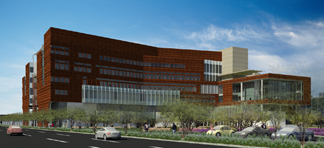Phoenix Research Center
PHOENIX — The University of Arizona College of Medicine broke ground on a $187 million academic and research building at the downtown Phoenix Biomedical Campus.
When it reaches its scheduled completion in 2012, the new Health Sciences Education Building will house classrooms, labs, pre-clinical training suites, a learning resource center, study areas and faculty offices for health sciences students, staff and educators.
The 268,000-square-foot building will allow the College of Medicine–Phoenix to expand its class size from 48 students per year to 120. The UA College of Pharmacy, the UA Mel and Enid Zuckerman College of Public Health and the Northern Arizona College of Health and Human Services will all have programs in the new building.

The project has been financed largely by state lottery revenues, with approximately 20 percent university funding.
“From an economic standpoint, the building will help transform Arizona’s economy,” says Robert Shelton, president of the University of Arizona. “It solidifies the Phoenix Biomedical Campus as the center of biomedical innovation, research and engineering. The Health Sciences Education Building will help the UA increase our research portfolio and enhance and establish important biotechnology partnerships in greater Phoenix.”
A joint venture of DPR Construction of San Jose, Calif., and Sundt Construction Inc. of Tucson is building the health sciences center, which was designed by architects Ayres/Saint/Gross, with an office in Tempe, and CO Architects of Los Angeles.
The new building is part of an overarching plan to create a major academic and research health hub in downtown Phoenix known as the Phoenix Biomedical Campus — a 28-acre urban park and the proposed site of 6 million square feet of biomedical-related academic, research, and laboratory space. Officials estimate the campus will generate $2.1 billion annually.
The Phoenix Biomedical Campus is currently home to the headquarters of the Translational Genomics Research Institute and the International Genomics Consortium, laboratories of the National Institute of Diabetes and Digestive and Kidney Disorders, and the Arizona Biomedical Collaborative I, headquarters of the ASU Department of Bioinformatics.
